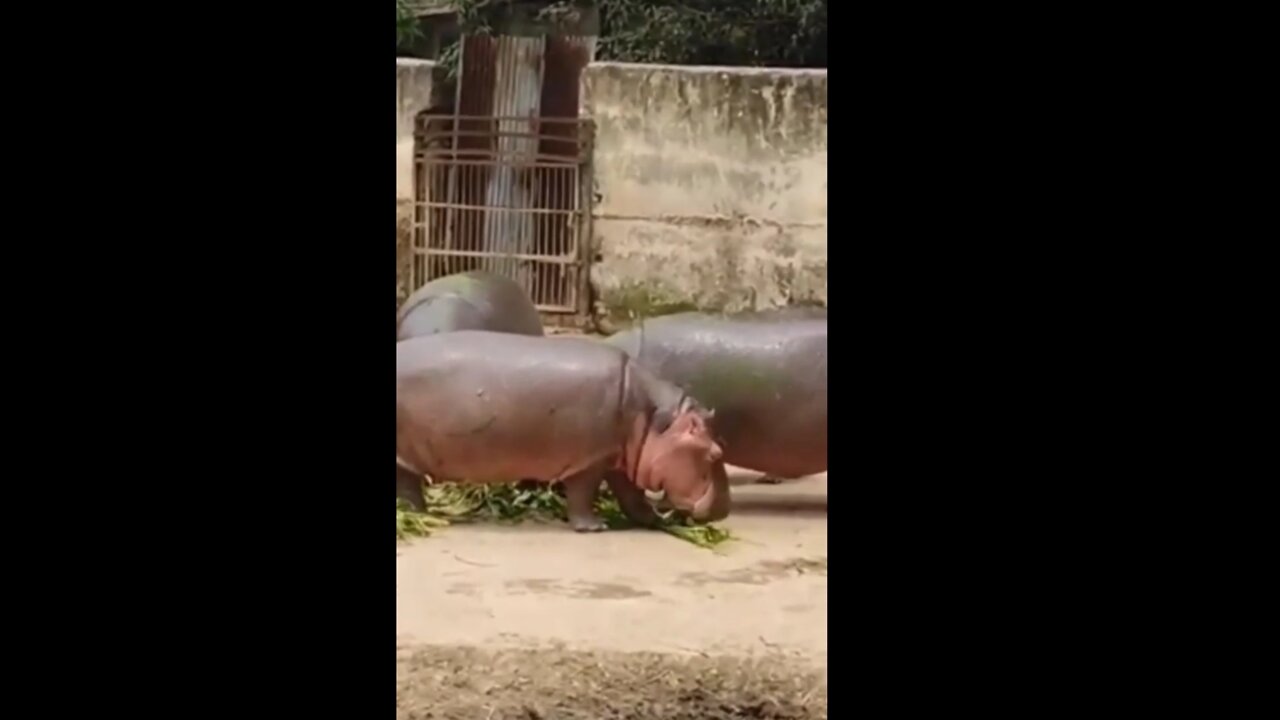Premium Only Content

Hippocampus eting gress.
The hippopotamus (/ˌhɪpəˈpɒtəməs/ HIP-ə-POT-ə-məs;[3] Hippopotamus amphibius), also called the hippo, common hippopotamus, or river hippopotamus, is a large semiaquatic mammal native to sub-Saharan Africa. It is one of only two extant species in the family Hippopotamidae, the other being the pygmy hippopotamus (Choeropsis liberiensis or Hexaprotodon liberiensis). Its name comes from the ancient Greek for "river horse" (ἱπποπόταμος).
HippopotamusA hippopotamus in Saadani National Park, Tanzania
Conservation status

Vulnerable (IUCN 3.1)[1]
CITES Appendix II (CITES)[1]
Scientific classificationKingdom:AnimaliaPhylum:ChordataClass:MammaliaOrder:ArtiodactylaFamily:HippopotamidaeGenus:HippopotamusSpecies:
H. amphibius
Binomial nameHippopotamus amphibius
Linnaeus, 1758[2]
Range map of the hippopotamus. Historic range is in red while current range is in green.[1]
Aside from elephants and rhinos, the hippopotamus is the largest land mammal. It is also the largest extant land artiodactyl. Despite their physical resemblance to pigs and other terrestrial even-toed ungulates, the closest living relatives of the Hippopotamids are cetaceans (whales, dolphins, porpoises, etc.), from which they diverged about 55 million years ago. Hippos are recognisable for their barrel-shaped torsos, wide-opening mouths with large canine tusks, nearly hairless bodies, pillar-like legs, and large size: adults average 1,500 kg (3,310 lb) for bulls (males) and 1,300 kg (2,870 lb) for cows (females). Despite its stocky shape and short legs, it is capable of running 30 km/h (19 mph) over short distances.
Hippos inhabit rivers, lakes, and mangrove swamps. Territorial bulls each preside over a stretch of water and a group of five to thirty cows and calves. Reproduction and birth both occur in the water. During the day, hippos remain cool by staying in water or mud, emerging at dusk to graze on grasses. While hippos rest near each other in the water, grazing is a solitary activity and hippos typically do not display territorial behaviour on land. Hippos are among the most dangerous animals in the world due to their highly aggressive and unpredictable nature. They are threatened by habitat loss and poaching for their meat and ivory (canine teeth).
-
 LIVE
LIVE
Matt Kohrs
9 hours agoMarkets Tilted, OPEX Chaos & Payday Friday || Live Trading
532 watching -
 LIVE
LIVE
Wendy Bell Radio
4 hours agoOh HELL NO
6,782 watching -
 DVR
DVR
Chad Prather
18 hours agoWhen God Shakes the Room: Bold Faith in a Fearful World
52.7K30 -
 LIVE
LIVE
LFA TV
11 hours agoLIVE & BREAKING NEWS! | FRIDAY 11/21/25
2,877 watching -
 58:40
58:40
Julie Green Ministries
2 hours agoLIVE WITH JULIE
61.7K104 -
 1:01:10
1:01:10
Crypto Power Hour
11 hours ago $1.39 earnedAnimus Bitcoin Technology
20.7K8 -
 LIVE
LIVE
Game On!
18 hours ago $2.07 earnedAnother FOOTBALL FRIDAY! Weekend Preview And BEST BETS!
19 watching -
 31:55
31:55
ZeeeMedia
19 hours agoHow Gold & Silver Fight Against Digital ID ft. Bill Armour | Daily Pulse Ep 148
7.26K9 -
 13:29
13:29
Clintonjaws
15 hours ago $15.01 earnedCNN Host Stops Show & Plays Surprise Clip Forcing Democrat To Correct Lie
31.5K25 -
 14:55
14:55
World2Briggs
19 hours ago $1.91 earnedThe 10 U.S. Cities Americans Can No Longer Afford — 2025 Edition
9.91K